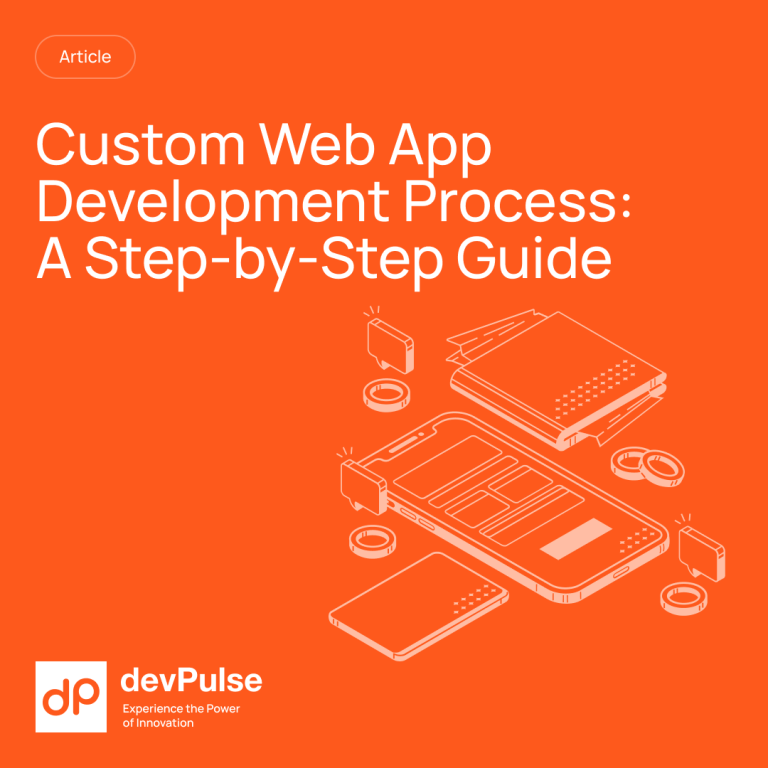Were you looking for a sign? Well, here it is! 🤓
Jokes aside, that’s quite a shrewd and logical question to ask oneself as a business owner: do I really need this or that thing?
Because as the experience shows: just because everyone else is doing it, doesn’t mean it has a tangible benefit!
Of course, having a digital presence is almost always a must for today’s business, but do you need a custom solution or just a out-of-the-box one will serve you as well?
The straightforwardest possible answer I can give you is that it will depend on many things, that I cannot really cram into the length of one article without making it a painful slog to waddle through.
Instead, let me just quickly walk you through a few common signs telling you: yes, this IS a sign you need a custom web solution.
Sign #1: Inefficient manual processes hindering your business growth
I’m not opposed to some manual labor, but I don’t think it has any place in the business setting, mainly digital. If you could accomplish great things through repetition, all companies would be successful. That they are not.
So, work optimization-wise, we need to push all the possible routine and menial into automation to give us time and space for creative efforts.
Think about it this way: every hour shaved off from doing manual nonsense is the hour you can spend strategically.
If you reach the point and scale where your employees have to waddle through bureaucratic routine before they can start doing something meaningful then I think it’s time to do something about it.
Examples of manual tasks ready for automation
- Data entry and management: Manually inputting and updating data across multiple spreadsheets or systems can be time-consuming and error-prone. A custom web app can automate data entry, ensure consistency, and provide a centralized database for easy access and management.
- Inventory tracking and updates: Keeping track of inventory levels, orders, and shipments can be daunting when done manually. With a bespoke solution, you can automate inventory management, provide real-time updates, and alert you when stock levels run low, ensuring you never miss a sale due to stockouts.
- Generating reports and analytics: Compiling data from various sources and creating reports manually can take hours or even days. By creating automatic reports, you can access critical metrics and insights for data-driven decision-making.
- Processing orders and invoices: A custom web app can automate order processing, generate invoices, and integrate with payment gateways, streamlining your sales process and improving cash flow.
- Scheduling and appointment management: Managing schedules and appointments across multiple staff members and clients can be a logistical nightmare when done manually. Automate scheduling, send reminders, and allow clients to book appointments online, reducing no-shows and improving customer satisfaction.
If reading any of these made you go: “Hmm, yes, I do feel like we spend too much time doing these thingamajigs, ” maybe it’s time to do something about it.
And now just to illusrtate these examples a bit further, let’s look at the hypothetical before and after implementing a custom web solution.
Before custom web application
A retail store owner spends hours manually updating inventory levels, generating sales reports, processing orders, creating invoices, and communicating with customers. These time-consuming and error-prone tasks leave little time for strategic planning and growth initiatives, while also increasing the risk of human error that can impact the business.
After custom web application
A custom web application automates inventory management, order processing, invoicing, and customer communication. It generates real-time reports and frees up the owner’s time to focus on expanding the business, while minimizing the potential for costly mistakes.
Why not an out-of-the-box solution?
While there are many off-the-shelf inventory management and reporting tools available, they may not fully align with the unique processes and requirements of your business. These generic solutions often lack the flexibility to adapt to your specific needs, leading to workarounds and inefficiencies.
Sign #2: Siloed data and lack of integration hampering business efficiency
Scattering your data across multiple disconnected systems leads to a host of problems. Your team will spend much time asking, looking, and waiting for data, leading to delays, errors, and poor decision-making. Here’s how a custom web application can help:
- Seamless data flow: A custom web app can integrate with your existing systems, allowing data to flow seamlessly between departments and applications. This eliminates the need for manual data entry and reduces the risk of errors.
- Centralized data management: With a custom web application, all your data is stored in a central location, making it easier to manage, update, and analyze. This centralized approach ensures that everyone in your organization can access the same accurate and up-to-date information.
- Improved collaboration: When data is easily accessible and shared across departments, it fosters better collaboration and communication among team members. A custom web app can provide tools for real-time collaboration, such as shared workspaces, comment sections, and notifications.
- Better decision-making: With integrated data and real-time access to critical metrics, decision-makers can gain a more comprehensive view of the business.
Before custom web application
A marketing agency struggles with scattered data across multiple platforms, leading to inconsistencies, duplication of efforts, and delays in client reporting. The lack of real-time data access hinders informed decision-making and limits the agency’s ability to provide valuable insights to clients.
After custom web application
A custom web app provides a centralized dashboard for easy access and analysis, enabling the agency to deliver timely, accurate reports to clients and make data-driven decisions for improved campaign performance.
Why not an out-of-the-box solution?
Out-of-the-box data management tools often focus on specific functions, such as CRM or marketing automation, but fail to provide a holistic view of your data. Integrating these disparate tools can be complex and costly, often requiring manual data syncing or third-party connectors. Moreover, these generic solutions may not offer the level of customization needed to meet your agency’s unique reporting and analysis requirements.
Sign #3: Scalability issues and limitations restricting business growth
As your business expands, you may find that off-the-shelf software solutions and generic applications can no longer meet your unique requirements. These limitations can hinder your ability to scale operations effectively and capitalize on new growth opportunities.
Here’s how a custom web application can help you overcome scalability issues and drive business growth:
- Tailored to your needs: A tailored approach ensures the application can accommodate your business’s evolving needs and scale alongside your operations.
- Flexible and adaptable: With a custom web application, you can add new features, functionalities, and integrations as your business requirements change.
- Improved performance: Generic software solutions often come with a host of features that your business may not need, which can slow down performance and hinder scalability. A custom web app is optimized for your specific use case, ensuring faster load times, better responsiveness, and improved overall performance.
- Seamless integration: A custom web application can be designed to seamlessly integrate with your existing infrastructure and third-party services, providing a smooth transition and minimal disruption to your business.
- Future-proof: A custom web app is built with your long-term growth in mind. It can be designed to accommodate future expansions, new product lines, and increased user traffic, ensuring that your technology infrastructure can keep pace with your business growth.
Before custom web application
A fast-growing e-commerce business faces performance issues and crashes during peak sales periods, resulting in lost revenue and customer frustration. The generic e-commerce platform limits growth due to its inability to handle increased traffic, limited customization options, and poor user experience, which can negatively impact search engine rankings.
After custom web application
Built with scalability in mind, a bespoke solution ensures smooth performance during high-traffic events. It can be designed to handle spikes in traffic, integrate with third-party services, and provide a seamless user experience, accommodating the business’s growth and improving online visibility.
Why not an out-of-the-box solution?
Generic e-commerce often struggle to accommodate the specific needs of fast-growing businesses. These platforms may have limitations in terms of customization, scalability, and performance optimization. As your business grows, you may encounter issues like slow page load times, limited payment gateway options, or inability to handle high traffic volumes, which can negatively impact your customer experience and hinder growth.
Sign #4: Compromised security and data privacy risks threatening your business
Relying on generic, third-party applications can expose your company to potential security risks, data breaches, and compliance issues. A custom web application can help you mitigate these risks and ensure the safety of your sensitive business data.
Here’s how:
- Enhanced security measures: A custom web app can be built with robust security features tailored to your specific needs, such as encrypted data storage, secure user authentication, and role-based access control. These measures help protect your business data from unauthorized access and potential security threats.
- Compliance with regulations: Depending on your industry and location, your business may be subject to various data privacy regulations, such as GDPR or HIPAA. A custom solution can ensure compliance with these regulations, protecting your business from potential legal and financial repercussions.
- Complete control over data: Full control over your data allows you to implement strict data management policies, monitor access logs, and quickly respond to any security incidents or privacy concerns.
- Regular security updates: A custom web application can be updated and patched to address the latest security vulnerabilities and threats as soon as possible. With third-party dependencies, however, the speed is outside your control.
Before custom web application
A healthcare provider relies on generic software that lacks adequate security measures, putting sensitive patient data at risk of breaches and non-compliance with regulations. The software’s vulnerabilities, such as lack of encryption and weak access controls, can lead to legal liabilities, financial losses, and reputational damage.
After custom web application
A custom solution incorporates advanced security measures like multi-factor authentication, role-based access control, and regular security audits, ensuring the healthcare provider maintains a trustworthy reputation and avoids costly data breaches.
Why not an out-of-the-box solution?
Readymade tools may lack the necessary encryption, access controls, and auditing capabilities needed to protect sensitive patient data and meet regulatory standards like HIPAA. Relying on such solutions can put your healthcare organization at risk of data breaches, legal penalties, and reputational damage.
Sign #5: Suboptimal customer experience limiting business growth and retention
Outdated, inefficient, or poorly designed systems can frustrate customers, reducing satisfaction and lower retention rates.
Here’s what a custom solution can do about it.
- Personalized experiences: A custom web app can be designed to deliver customized experiences based on your ideal customer profile (ICP). Thus, you won’t be creating it all for some abstract catch-all like out-of-the-box options do, but you would be able to cater to your exact audience.
- Streamlined user journeys: A well-designed custom web application can simplify and streamline user journeys, making it easier for customers to find what they need, complete transactions, and access support.
- Seamless omnichannel integration: A custom web app can be integrated with other customer touchpoints, such as mobile apps, social media, and brick-and-mortar stores. This seamless integration allows customers to engage with your brand across multiple channels, providing a consistent and cohesive experience.
- Faster issue resolution: A custom web application can include features like live chat, self-service portals, and knowledge bases, empowering customers to find answers to their questions and resolve issues quickly.
- Continuous improvement: With a custom web app, you can continuously gather customer feedback, analyze user behavior, and iterate on your customer experience.
Before custom web application
A financial services company uses a generic customer portal that fails to address the unique needs of its high-net-worth clients. The portal’s limited self-service options, lack of personalization, and poor user experience lead to dissatisfaction and churn, impacting the company’s growth and reputation.
After custom web application
A custom web application, tailored to the preferences and requirements of the company’s target audience, provides a personalized and intuitive user experience. It offers features like personalized recommendations, streamlined onboarding, and 24/7 customer support, improving customer satisfaction and loyalty, and driving business growth through word-of-mouth referrals.
Why not an out-of-the-box solution?
These generic portals may lack the personalization, advanced features, and white-glove service that your clients expect. Attempting to customize these off-the-shelf solutions can be time-consuming, expensive, and may still not yield the desired results, leading to customer dissatisfaction and churn.
Conclusion
Again, these are but a few signs you should be on a lookout for that should make you CONSIDER (but only that!) a customized web solution.
But how do you know for certain? Well, that’s what we’re here for!
Choosing a good web dev partner is a two-way street as we’re, too, looking for something that matches our expertise and expectations.
So, if you’re curious about custom web dev, want us to run an audit of your current project and tell you if there’s something that can be done about it, then let’s talk!
We’ll be happy to have you.



